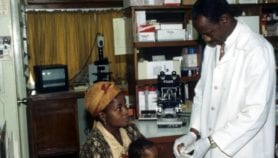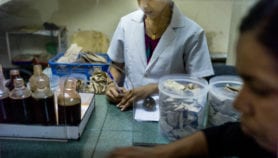Send to a friend
The details you provide on this page will not be used to send unsolicited email, and will not be sold to a 3rd party. See privacy policy.
A trial of a vaginal microbicide gel against HIV/AIDS has been stopped as early data have shown that it fails to reduce HIV infections.
This comes as a surprise as a previous trial of the same tenofovir gel, CAPRISA 004, found it reduced the risk of HIV infection by 39 per cent.
Researchers running the Vaginal and Oral Interventions to Control the Epidemic (VOICE) trial announced last week (25 November) that the gel worked no better than a placebo in around 2,000 women in trials in South Africa, Uganda and Zimbabwe.
"[The gel] didn’t work a little bit. It just flat out didn’t work," Sharon Hillier, a researcher at the University of Pittsburgh, United States, and head of the Microbicide Trials Network, which is conducting VOICE, told Science NOW.
Researchers suspect the VOICE trial may have failed because of a lack of adherence. "We’ve always worried that taking anything every day was going to be hard slog," said Hillier. "It’s hard to do something every day for something you don’t have yet."
Salim Abdool Karim, director of the Centre for the AIDS Programme of Research in South Africa (CAPRISA), who led the earlier trial and who recently won an award for his work on tenofovir gel, said in a statement: "These results were totally unexpected as there is good evidence from laboratory research, animal studies and human trials showing that tenofovir gel prevents HIV. However, science does not always produce the answer we hope for."
The task now is to compare VOICE and CAPRISA 004 trials to find out what went wrong, said Connie Celum, an epidemiologist at the University of Washington, United States.
Research on microbicide gels has had many twists and turns, with an earlier gel, dubbed PRO 2000, first showing promise in 2009, then proving ineffective in clinical trials. Other gels failed to show protection in phase III trials, or even increased the risk of HIV.
Link to full article in Science NOW
Link to statement on discontinuation of use of tenofovir in trials













